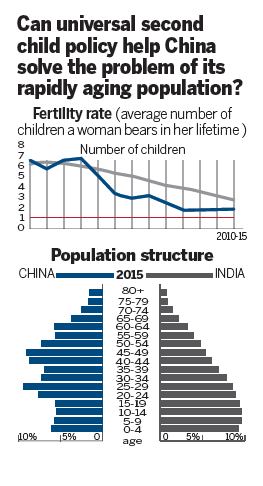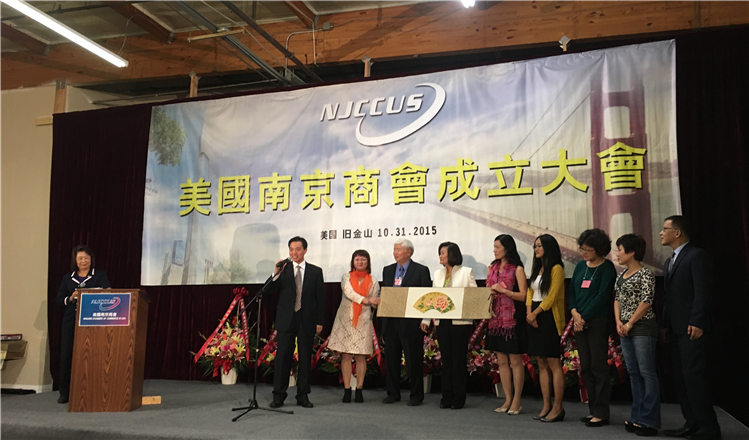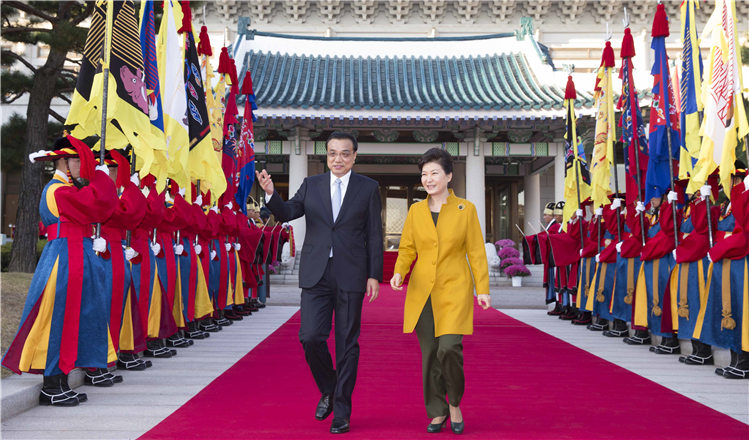Family planning policy sees big overhaul
Updated: 2015-10-30 06:50
By Shan Juan(China Daily)
|
||||||||
 |
|
Li Shuchun, 4, and his 7-month-old brother Li Shuhan, live in Beijing with their parents who are among the 1.07 million out of 11 million eligible couples applied to have a second child by the end of last year. [Photo by Wang Nina/Provided to chinadaily.com.cn] |
New initiative will actively address nation's aging problem, experts say
China further relaxed its more than three-decade-old family planning policy, according to a statement issued on Thursday by the Communist Party of China Central Committee.
Roughly 90 million Chinese couples will become eligible to have a second child.
It's the latest move by the authorities to finetune the family planning policy, amid the nation's changing demographics, which could lead to potential labor shortages in the future if not addressed.
|
 |
Yuan Xin, a population scientist at Nankai University in Tianjin, who sits on an expert panel of the National Health and Family Planning Commission, said scrapping the family planning policy remained a long way off.
"The new initiative will be much better received among the Chinese people than the previous policy relaxation and will help boost China's labor supply in the long run," he said.
In late 2013, the central government relaxed the family planning policy, allowing couples to have a second child in situations where one spouse was an only child. As of June, only 1.5 million of the 11 million eligible couples had applied to have a second child.
The latest change will affect rural families most, as 60 percent of the newly eligible are rural people who tend to be more interested than city dwellers in having bigger families, Yuan said.
Also, it's more urgent for the eligible couples, he said, as 60 percent of them are 35 years or older.
Yuan also suggested adding more favorable socioeconomic policies to make it easier for couples to raise more children. These primarily include improved reproductive and maternity care and easier access to infant nursing services and schooling, said a statement issued by the National Health and Family Planning Commission.
The universal two-child policy came at the right time, as the population growth trend has weakened and the size of the workforce is dwindling, the statement said. "It will help reverse the trend and sustain the nation's economic growth."
Official statistics show that China's potential workforce-people aged 16 to 59-peaked around 2011, and has been in decline since then. At the same time, the number of working people has been falling as a proportion of the total population.
Last year, there were 916 million people between the ages of 16 and 59 in China, roughly 66 percent of the entire population. That peaked at 74.5 percent in 2010 and has been falling since.
At the same time, the ratio of children in the population has been dwindling, creating a potential future shortage of workers, said Mu Guangzong, a demographics expert at Peking University.
"The looming labor shortage will upset the sustainable socioeconomic development of the country," Mu warned. He suggested more aggressive approaches to reverse the trend and fuel population growth.
"China should end limits on family size thoroughly, and immediately implement a population revitalization initiative to encourage reproduction," he said.
Obstacles to childbearing include rising nursing and education costs, more women in the workforce, late marriage and the increasing number of single adults, experts said.
- Insurance for caring services sought in rapidly aging capital
- Criminal Law amended to combat terrorist activities
- Swimmers battle against the cold in ice-covered river
- Silent disco yoga class in HK quiets body and mind
- Endangered storks flock to reserve in record numbers
- Green victory in court seen as setting trend

 Chinese go the distance for marathon
Chinese go the distance for marathon
 First made-in-China large plane rolls off assembly lines
First made-in-China large plane rolls off assembly lines
 Mega projects undertaken in 2011-2015
Mega projects undertaken in 2011-2015
 The world in photos: Oct 26 - Nov 1
The world in photos: Oct 26 - Nov 1
 Art installations brighten Shanghai subway
Art installations brighten Shanghai subway
 Radwanska masters art of finishing on a high note
Radwanska masters art of finishing on a high note
 Nanjing Chamber of Commerce sets up in Silicon Valley
Nanjing Chamber of Commerce sets up in Silicon Valley
 South Korean President welcomes Premier Li Keqiang
South Korean President welcomes Premier Li Keqiang
Most Viewed
Editor's Picks

|

|

|

|

|

|
Today's Top News
Tu first Chinese to win Nobel Prize in Medicine
Huntsman says Sino-US relationship needs common goals
Xi pledges $2 billion to help developing countries
Young people from US look forward to Xi's state visit: Survey
US to accept more refugees than planned
Li calls on State-owned firms to tap more global markets
Apple's iOS App Store suffers first major attack
Japan enacts new security laws to overturn postwar pacifism
US Weekly

|

|







